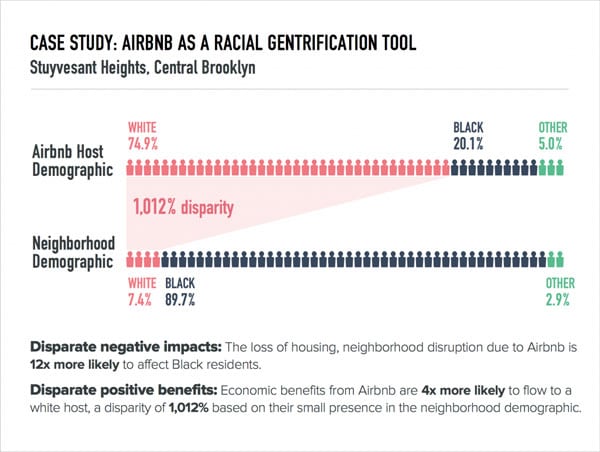
July 26, 2018; Wired
In 2016, as Airbnb began to emerge as the go-to company for home-sharing, it was blindsided by a publicity scandal on Twitter called #Airbnbwhileblack, in which Black customers detailed racist encounters with the company’s hosts. Shortly after the hashtag gained national attention, Harvard University released a study showing that Airbnb guests with traditional Black names found it harder to book rentals. For a company whose brand relied on the generosity of strangers, Airbnb had to move quickly and decisively to mitigate the damage.
After meeting with a range of community groups and experts, including former US Attorney General Eric Holder, Color of Change, the National Urban League, and the American Civil Liberties Union, the company released a report detailing its plan to build a more inclusive company. Under its Diversity Rule policy, Airbnb would work to recruit more hosts and guests from underrepresented communities.
How exactly would the company build credibility among Blacks? By partnering with the NAACP, a 108-year-old nonprofit known for its anti-discrimination work. In addition to receiving street cred from the NAACP, the company also gained access to an untapped market of potential customers. In return, the NAACP would receive 20 percent of earnings for each host it recruited.
Similar to Airbnb’s partnership with WIN to eradicate homelessness in New York, the company’s most recent initiative with the NAACP was not created solely out of altruism. Many could see this alliance as a reactionary measure due to bad publicity and a ploy to gain access to a potential crop of new customers. Furthermore, concerns over Airbnb being used as a tool for gentrification were not addressed in the joint statement announcing the partnership.
Sign up for our free newsletters
Subscribe to NPQ's newsletters to have our top stories delivered directly to your inbox.
By signing up, you agree to our privacy policy and terms of use, and to receive messages from NPQ and our partners.
While the NAACP hails the initiative as a way to increase economic security for homeowners and increase tourism in neighborhoods of color, a growing number of community organizations have joined together to call for tighter regulation of short-term rentals. For instance, in a letter addressed to the Federal Trade Commission, the Partnership for Working Families asserts, “Cities are struggling to address urgent shortages of affordable housing and there is evidence that commercial interests in the [short-term rental] industry are removing residential units from housing markets and thereby contributing to even higher rents.”
Research supports this assertion. In a report issued by the Los Angeles Alliance for a New Economy (LAANE), in 2015 renters incurred more than $464 million in increased rent due to short-term rentals. Research conducted by Puget Sound Sage in 2016 estimates that Seattle could lose approximately 1,600 long-term rental units within three years if short-term rentals continue to grow at its current rate.
Despite accusations of causing gentrification, Airbnb has continued its efforts to appeal to Blacks. In a 2016 report released by Airbnb, the company uses positive testimonials of middle class Black homeowners to target this demographic. The report also states that in 30 of New York’s predominantly Black neighborhoods, “the number of Airbnb guests grew 78 percent year over-year, versus 51 percent citywide.” However, as NPQ has reported in the past, Airbnb neglects to mention the removal of long-term rentals off the market in favor of short-term rentals as a major reason for the increase in home-sharing.
One year since the partnership was announced, the true benefits have yet to be seen. The initial launch took nine months to execute because of the need to find strong NAACP chapters located in areas with potential for Airbnb growth. In addition to Miami and Los Angeles, where the first rollouts occurred this spring, cities such as Chicago, San Francisco, Boston, and New York are currently being considered.
Ultimately, the prevailing question will be whether the NAACP gave credence to an organization that may lead to the displacement of the very people it hopes to serve. In an effort to provide more economic options to homeowners, it may have made these same neighborhoods vulnerable to the effects of gentrification by further accelerating housing instability for renters. For nonprofits interested in corporate partnerships, such arrangements call into question the true intentions of businesses and the ramifications of taking on for-profit partners especially when a company may exacerbate a social issue an organization is actively fighting against.—Chelsea Dennis













